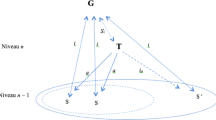Abstract
The question of whether mathematics depends on experience, including experience of the external world, is problematic because, while it is clear that natural sciences depend on experience, it is not clear that mathematics depends on experience. Indeed, several mathematicians and philosophers think that mathematics does not depend on experience, and this is also the view of mainstream philosophy of mathematics. However, this view has had a deleterious effect on the philosophy of mathematics. This article argues that, in fact, the view is not valid. Mathematics depends on experience because experience influences the making of mathematics, indeed much mathematics arises from experience and is evaluated on the basis of experience.
Similar content being viewed by others
Data Availability
Not applicable.
References
Atiyah, M. (2004). Interview. In M. Raussen, & C. Skau. Interview with Michael Atiyah and Isadore Singer. Newsletter of the European Mathematical Society, 53, 24–30.
Atiyah, M., et al. (1994). Responses to: A. Jaffe, & Quinn, F., theoretical mathematics: Toward a cultural synthesis of mathematics and theoretical physics. Bulletin of the American Mathematical Society, 30, 178–207.
Atiyah, M., Dijkgraaf, R., & Hitchin, N. (2010). Geometry and physics. Philosophical Transactions of the Royal Society A, 368, 913–926.
Brouwer, L. E. J. (1975). Collected works 1: Philosophy and foundation of mathematics. North-Holland.
Cellucci, C. (2007). La Filosofia della matematica del novecento. Laterza.
Cellucci, C. (2013). Rethinking logic. Logic in relation to mathematics, evolution, and method. Springer.
Cellucci, C. (2022). The making of mathematics: Heuristic philosophy of mathematics. Springer.
Cellucci, C. (2023). Introducing heuristic philosophy of mathematics. Annals of Mathematics and Philosophy, 1, 25–46.
Clagett, M. (1999). Ancient Egyptian science: A source book, Volume 3: Ancient Egyptian mathematics. American Philosophical Society.
Dummett, M. (2010). The nature and future of philosophy. Columbia University Press.
Frege, G. (1960). The foundations of arithmetic: A logico-mathematical enquiry into the concept of number. Harper.
Frege, G. (1967). Begriffsschrift, a formula language, modeled upon that of arithmetic, for pure thought. In van J. Heijenoort (Ed.), From Frege to Gödel. A source book in mathematical logic, 1879–1931 (pp. 5––82). Harvard University Press.
Frege, G. (1979). Posthumous writings. Blackwell.
Frege, G. (1980). Philosophical and mathematical correspondence. Blackwell.
Frege, G. (1984). Collected papers on mathematics, logic, and philosophy. Blackwell.
Frege, G. (2013). Basic laws of arithmetic: Derived using concept-script. Oxford University Press.
George, A., & Velleman, D. J. (2002). Philosophies of mathematics. Blackwell.
Giaquinto, M. (2002). The search for certainty: A philosophical account of foundations of mathematics. Oxford University Press.
Hersh, R. (1979). Some proposals for reviving the philosophy of mathematics. Advances in Mathematics, 31, 31–50.
Hersh, R. (1997). What is mathematics, really? Oxford University Press.
Hersh, R. (2014). Experiencing mathematics: What do we do, when we do mathematics? American Mathematical Society, 2014.
Hilbert, D. (1996a). The new grounding of mathematics: First report. In W. Ewald (Ed.), From Brouwer to Hilbert: A source book in the foundations of mathematics (Vol. 2, pp. 1117–1134). Oxford University Press.
Hilbert, D. (1996b). The logical foundations of mathematics. In W. Ewald (Ed.), From Brouwer to Hilbert: A source book in the foundations of mathematics (Vol. 2, pp. 1134–1148). Oxford University Press.
Hilbert, D. (2004). Grundlagen der Euklidischen Geometrie. In M.l Hallett, & U. Majer (Eds.), David Hilbert’s lectures on the foundations of geometry 1891–1902 (pp. 221–286). Springer.
Hilbert, D. (2013). Lectures on the foundations of arithmetic and logic 1917–1933. Springer.
Hilbert, D., & Bernays, P. (1968–1970). Grundlagen der Mathematik. Springer.
Hintikka, J., & Remes, U. (1974). The method of analysis: Its geometrical origin and its general significance. Reidel.
Klenk, V. (1990). What mathematical truth need not be. In M. Dunn, & A. Gupta (Eds.), Truth or consequences essays in honor of Nuel Belnap (pp. 197–208). Kluwer.
Knorr, W. (1993). The ancient tradition of geometric problems. Dover.
Lakatos, I. (1961). Essays in the logic of mathematical discovery, PhD thesis. Cambridge University.
Mac Lane, S. (1986). Mathematics: Form and function. Springer.
Monk, J. D. (1976). Mathematical logic. Springer.
Rédei, M. (2020). On the tension between physics and mathematics. Journal for General Philosophy of Science, 51, 411–425.
Rota, G. C. (1997). Indiscrete thoughts. Springer.
Russell, B. (1971). Autobiography. Allen & Unwin.
Todayama, K. (2015). What is experimental philosophy of mathematics? Annals of the Japan Association for Philosophy of Science, 23, 53–58.
Williamson, T. (2022). The philosophy of philosophy. Wiley.
Zweig, S. (1964). The world of yesterday: An autobiography. University of Nebraska Press.
Acknowledgements
I am grateful to an anonymous reviewer for many valuable suggestions that have helped me to improve the paper.
Funding
No funding was received for the preparation of this article.
Author information
Authors and Affiliations
Contributions
This paper is entirely due to the author, Carlo Cellucci.
Corresponding author
Ethics declarations
Ethical Approval
Not applicable.
Competing Interests
The authors declare no competing interests.
Additional information
Publisher’s Note
Springer Nature remains neutral with regard to jurisdictional claims in published maps and institutional affiliations.
Rights and permissions
Springer Nature or its licensor (e.g. a society or other partner) holds exclusive rights to this article under a publishing agreement with the author(s) or other rightsholder(s); author self-archiving of the accepted manuscript version of this article is solely governed by the terms of such publishing agreement and applicable law.
About this article
Cite this article
Cellucci, C. Mathematics and Experience. Found Sci (2024). https://doi.org/10.1007/s10699-024-09943-2
Accepted:
Published:
DOI: https://doi.org/10.1007/s10699-024-09943-2




